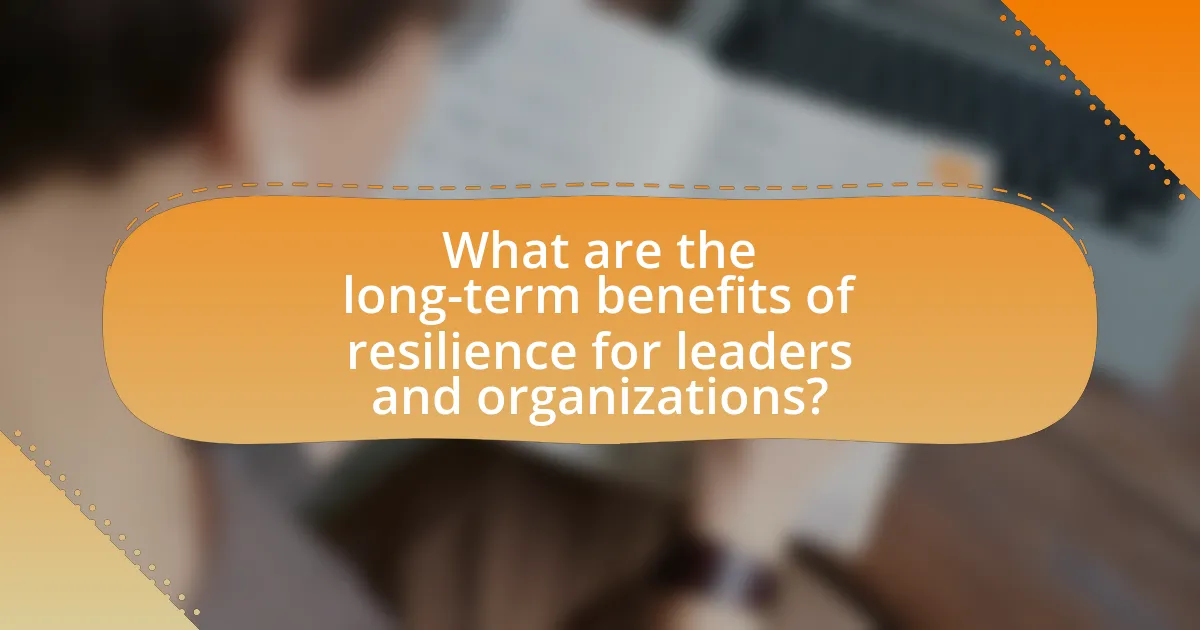Developing resilience as a leader in uncertain times is essential for navigating challenges and maintaining organizational stability. This article explores the importance of resilience, highlighting key characteristics of resilient leaders, such as adaptability and emotional intelligence, and their impact on decision-making and team morale. It also addresses the challenges leaders face during crises, the influence of external factors, and internal struggles that can arise. Strategies for cultivating resilience within oneself and teams, including fostering open communication and promoting a growth mindset, are discussed, along with the long-term benefits of resilience for both leaders and organizations.

What does it mean to develop resilience as a leader in uncertain times?
Developing resilience as a leader in uncertain times means cultivating the ability to adapt, recover, and thrive amidst challenges and unpredictability. This involves maintaining a positive outlook, making informed decisions under pressure, and effectively managing stress while guiding teams through adversity. Research indicates that resilient leaders foster a supportive environment, encouraging open communication and collaboration, which enhances team morale and performance during crises. For instance, a study by the American Psychological Association highlights that leaders who demonstrate resilience can significantly improve their team’s ability to cope with stress and uncertainty, ultimately leading to better organizational outcomes.
Why is resilience important for leaders during challenging periods?
Resilience is crucial for leaders during challenging periods because it enables them to navigate adversity effectively and maintain organizational stability. Leaders who demonstrate resilience can adapt to changing circumstances, inspire their teams, and make informed decisions under pressure. Research indicates that resilient leaders foster a positive work environment, which enhances employee morale and productivity, even in difficult times. For instance, a study published in the Journal of Occupational Health Psychology found that resilient leadership is linked to lower employee burnout and higher job satisfaction, highlighting the importance of resilience in sustaining team performance during crises.
What are the key characteristics of resilient leaders?
Resilient leaders possess key characteristics such as adaptability, emotional intelligence, and a strong vision. Adaptability allows them to navigate change effectively, as evidenced by studies showing that organizations led by adaptable leaders are more likely to thrive during crises. Emotional intelligence enables them to connect with their teams, fostering trust and collaboration, which is crucial in uncertain times. A strong vision helps resilient leaders to inspire and motivate their teams, providing direction and purpose even amidst challenges. These traits collectively empower leaders to maintain stability and drive success in fluctuating environments.
How does resilience impact decision-making in uncertain environments?
Resilience significantly enhances decision-making in uncertain environments by enabling individuals to maintain focus and adaptability amidst challenges. When leaders exhibit resilience, they are better equipped to analyze situations critically, weigh potential risks, and make informed choices despite ambiguity. Research indicates that resilient leaders demonstrate improved problem-solving skills and emotional regulation, which are crucial for navigating unpredictable circumstances. For instance, a study published in the Journal of Leadership Studies found that resilient leaders are more likely to foster a positive organizational climate, leading to better team performance and decision outcomes during crises. This evidence underscores the vital role resilience plays in effective decision-making under uncertainty.
What challenges do leaders face in uncertain times?
Leaders face significant challenges in uncertain times, primarily including decision-making under ambiguity, maintaining team morale, and adapting to rapid changes. Decision-making becomes complex as leaders must navigate incomplete information and unpredictable outcomes, which can lead to increased stress and potential missteps. Maintaining team morale is critical, as uncertainty can create anxiety among team members, requiring leaders to foster a supportive environment and clear communication. Additionally, leaders must adapt strategies quickly to respond to evolving circumstances, which demands flexibility and innovative thinking. These challenges are underscored by studies indicating that effective leadership during crises can significantly impact organizational resilience and employee engagement.
How do external factors contribute to uncertainty for leaders?
External factors contribute to uncertainty for leaders by introducing unpredictable variables that can impact decision-making and strategic planning. Economic fluctuations, such as recessions or market volatility, can alter consumer behavior and affect organizational performance. Political instability, including changes in government policies or regulations, can create an unpredictable environment that complicates long-term planning. Additionally, technological advancements can disrupt industries, requiring leaders to adapt quickly to maintain competitiveness. Research indicates that 70% of leaders cite external market conditions as a significant source of uncertainty, highlighting the critical need for adaptive strategies in leadership.
What internal struggles might leaders encounter during crises?
Leaders may encounter internal struggles such as fear of failure, decision paralysis, and emotional fatigue during crises. Fear of failure can lead to hesitation in making critical decisions, as leaders worry about the potential negative outcomes of their choices. Decision paralysis often arises from the overwhelming amount of information and pressure to act swiftly, causing leaders to become stuck and unable to move forward. Emotional fatigue can result from the constant stress and responsibility of guiding their teams through turbulent times, leading to burnout and decreased effectiveness. These struggles are documented in studies on leadership during crises, highlighting the psychological toll that uncertainty and high stakes can impose on leaders.

How can leaders cultivate resilience in themselves and their teams?
Leaders can cultivate resilience in themselves and their teams by fostering a culture of open communication, encouraging adaptability, and promoting a growth mindset. Open communication allows team members to express concerns and share experiences, which builds trust and collective problem-solving capabilities. Encouraging adaptability helps teams navigate change effectively, as research shows that organizations with flexible structures are more resilient during crises. Promoting a growth mindset, where challenges are viewed as opportunities for learning, enhances individual and team resilience, as evidenced by studies indicating that teams with a growth mindset are better equipped to handle setbacks and recover quickly.
What strategies can leaders implement to enhance their resilience?
Leaders can enhance their resilience by adopting strategies such as fostering a growth mindset, building strong support networks, and practicing self-care. A growth mindset allows leaders to view challenges as opportunities for learning and development, which is crucial in navigating uncertainty. Research by Dweck (2006) highlights that individuals with a growth mindset are more likely to embrace challenges and persist in the face of setbacks.
Additionally, cultivating strong support networks provides leaders with emotional and practical resources during difficult times. According to a study published in the Journal of Occupational Health Psychology, social support significantly mitigates stress and enhances resilience among leaders.
Finally, prioritizing self-care through regular physical activity, mindfulness practices, and adequate rest is essential for maintaining mental and emotional well-being. The American Psychological Association emphasizes that self-care practices can improve overall resilience and coping strategies in high-pressure environments.
How does self-awareness contribute to a leader’s resilience?
Self-awareness significantly enhances a leader’s resilience by enabling them to recognize their strengths and weaknesses, which fosters adaptability in challenging situations. When leaders possess self-awareness, they can better understand their emotional responses and triggers, allowing them to manage stress effectively and maintain composure during crises. Research indicates that self-aware leaders are more likely to seek feedback and learn from experiences, which contributes to their ability to bounce back from setbacks. For instance, a study published in the Journal of Leadership & Organizational Studies found that self-awareness is linked to improved decision-making and emotional regulation, both critical components of resilience in leadership.
What role does emotional intelligence play in building resilience?
Emotional intelligence plays a crucial role in building resilience by enabling individuals to understand and manage their emotions effectively, which enhances their ability to cope with stress and adversity. Research indicates that individuals with high emotional intelligence can better navigate challenges, maintain a positive outlook, and recover from setbacks more swiftly. For instance, a study published in the Journal of Occupational Health Psychology found that emotional intelligence is significantly correlated with resilience, suggesting that emotionally intelligent individuals are more adept at utilizing coping strategies and social support during difficult times. This ability to process emotions and respond constructively contributes to stronger resilience in leadership, particularly in uncertain environments.
How can leaders foster resilience within their teams?
Leaders can foster resilience within their teams by promoting a culture of open communication and psychological safety. This environment encourages team members to express concerns and share challenges without fear of judgment, which is essential for building resilience. Research indicates that teams with high psychological safety are more likely to engage in constructive conflict and problem-solving, leading to improved adaptability in the face of adversity. For instance, a study by Google found that psychological safety was the most important factor in effective team performance, highlighting its role in fostering resilience.
What practices can leaders adopt to support team resilience?
Leaders can adopt practices such as fostering open communication, promoting a culture of psychological safety, and encouraging adaptability to support team resilience. Open communication allows team members to express concerns and share ideas, which enhances trust and collaboration. A culture of psychological safety enables individuals to take risks without fear of negative consequences, leading to innovative problem-solving. Encouraging adaptability prepares teams to respond effectively to change, as evidenced by research from the Harvard Business Review, which highlights that resilient teams are more likely to thrive in uncertain environments. These practices collectively strengthen the team’s ability to navigate challenges and recover from setbacks.
How can communication strengthen resilience in teams?
Effective communication strengthens resilience in teams by fostering trust, enhancing collaboration, and facilitating problem-solving. When team members communicate openly, they share concerns and ideas, which builds a supportive environment. Research indicates that teams with strong communication practices are 25% more likely to adapt to challenges effectively, as they can quickly align on goals and strategies. Furthermore, clear communication reduces misunderstandings, allowing teams to respond to crises with agility and cohesion, ultimately leading to improved performance under pressure.

What are the long-term benefits of resilience for leaders and organizations?
The long-term benefits of resilience for leaders and organizations include enhanced adaptability, improved employee engagement, and sustained performance during crises. Resilient leaders can navigate challenges effectively, fostering a culture that encourages innovation and collaboration. Research indicates that organizations with resilient leadership experience 30% higher employee satisfaction and retention rates, as resilient leaders inspire confidence and commitment among their teams. Furthermore, resilient organizations are 50% more likely to recover quickly from setbacks, demonstrating that resilience not only strengthens leadership but also contributes to overall organizational success.
How does resilience influence organizational culture?
Resilience significantly influences organizational culture by fostering adaptability and a proactive mindset among employees. When an organization prioritizes resilience, it cultivates an environment where challenges are viewed as opportunities for growth, leading to increased innovation and collaboration. Research indicates that resilient organizations are better equipped to navigate change, with studies showing that companies with high resilience scores experience 30% less turnover and 25% higher employee engagement. This correlation underscores the importance of resilience in shaping a positive and dynamic organizational culture.
What are the effects of resilient leadership on employee morale?
Resilient leadership positively impacts employee morale by fostering a supportive and adaptive work environment. When leaders demonstrate resilience, they inspire confidence and trust among employees, which enhances their engagement and commitment to the organization. Research indicates that resilient leaders are more likely to promote open communication, provide constructive feedback, and encourage problem-solving, all of which contribute to higher morale. For instance, a study published in the Journal of Occupational Health Psychology found that teams led by resilient leaders reported increased job satisfaction and lower stress levels, highlighting the direct correlation between resilient leadership and improved employee morale.
How can resilience lead to improved organizational performance?
Resilience can lead to improved organizational performance by enabling organizations to adapt effectively to challenges and disruptions. When organizations cultivate resilience, they enhance their ability to recover from setbacks, maintain operational continuity, and foster a culture of innovation. Research indicates that resilient organizations are 2.5 times more likely to outperform their competitors in terms of profitability and productivity, as they can quickly pivot strategies in response to market changes. This adaptability not only minimizes downtime but also encourages employee engagement and retention, further driving performance improvements.
What are some common pitfalls leaders should avoid when developing resilience?
Leaders should avoid several common pitfalls when developing resilience, including neglecting self-care, failing to communicate effectively, and resisting change. Neglecting self-care can lead to burnout, which undermines a leader’s ability to support their team. Effective communication is crucial; leaders who do not share their vision or provide feedback can create uncertainty and disengagement among team members. Additionally, resisting change can hinder adaptability; leaders must embrace flexibility to navigate challenges successfully. Research indicates that organizations with resilient leaders are 2.5 times more likely to outperform their competitors, highlighting the importance of avoiding these pitfalls for effective leadership.
How can overconfidence undermine a leader’s resilience?
Overconfidence can undermine a leader’s resilience by leading to poor decision-making and an inability to adapt to challenges. When leaders overestimate their abilities or the accuracy of their judgments, they may ignore critical feedback and fail to recognize potential risks. This can result in a lack of preparedness for setbacks, ultimately diminishing their capacity to recover from adversity. Research indicates that overconfident leaders are more likely to engage in risky behaviors, which can exacerbate crises rather than mitigate them, thereby weakening their resilience in uncertain times.
What mistakes can hinder the resilience-building process in teams?
Mistakes that can hinder the resilience-building process in teams include poor communication, lack of trust, and insufficient support systems. Poor communication leads to misunderstandings and conflicts, which can erode team cohesion. A lack of trust among team members can prevent collaboration and open dialogue, essential for resilience. Insufficient support systems, such as inadequate resources or training, can leave teams ill-equipped to handle challenges, ultimately undermining their ability to bounce back from setbacks. Research indicates that teams with strong communication and trust are more likely to demonstrate resilience in the face of adversity, highlighting the importance of addressing these mistakes.
What practical tips can leaders use to enhance their resilience?
Leaders can enhance their resilience by practicing self-care, fostering a supportive network, and maintaining a growth mindset. Self-care involves prioritizing physical and mental health through regular exercise, adequate sleep, and mindfulness practices, which have been shown to improve emotional regulation and stress management. Building a supportive network allows leaders to share challenges and gain diverse perspectives, which can mitigate feelings of isolation and enhance problem-solving capabilities. Additionally, maintaining a growth mindset encourages leaders to view setbacks as learning opportunities, promoting adaptability and perseverance in the face of adversity. Research indicates that leaders who engage in these practices are better equipped to navigate uncertainty and lead effectively during challenging times.
How can leaders create a personal resilience plan?
Leaders can create a personal resilience plan by assessing their strengths and weaknesses, setting clear goals, and developing coping strategies. This involves identifying stressors and determining how to manage them effectively, such as through mindfulness practices or physical exercise. Research indicates that leaders who engage in regular self-reflection and seek feedback from peers are better equipped to adapt to challenges, as highlighted in a study by the American Psychological Association, which found that resilience training can significantly improve leadership effectiveness in high-pressure environments.
What daily habits can support a leader’s resilience journey?
Daily habits that can support a leader’s resilience journey include practicing mindfulness, maintaining a consistent exercise routine, and fostering strong social connections. Mindfulness practices, such as meditation, have been shown to reduce stress and enhance emotional regulation, which are crucial for resilience. Regular physical activity, supported by research from the American Psychological Association, improves mood and cognitive function, further bolstering a leader’s ability to cope with challenges. Additionally, nurturing relationships through regular communication and support networks provides emotional resources that enhance resilience during uncertain times.



